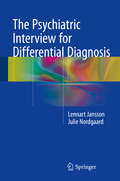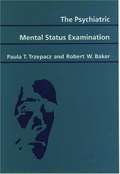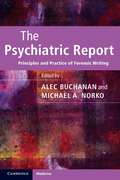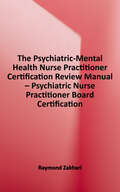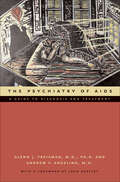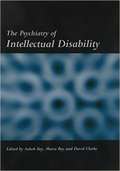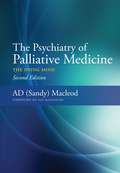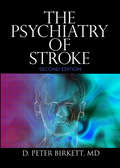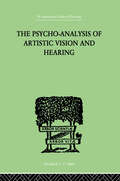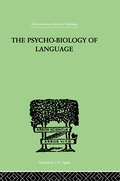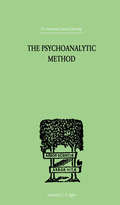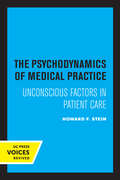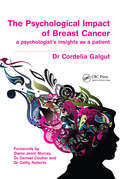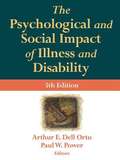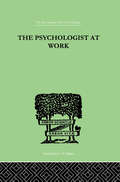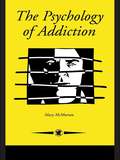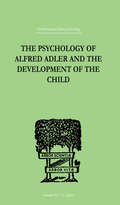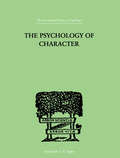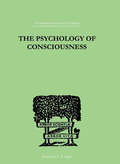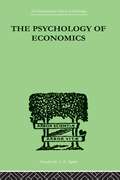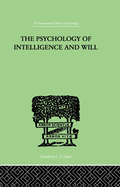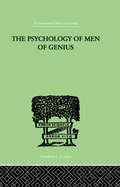- Table View
- List View
The Psychiatric Interview for Differential Diagnosis
by Lennart Jansson Julie NordgaardThis book offers an alternative to operational diagnostic manuals and manuals for structured interviewing as the only sources of theoretical and clinical knowledge. It provides an exposition of psychiatric interviewing that is theoretically and clinically well founded and supplies the reader with a coherent framework for performance of a thorough psychiatric examination. The goal is not to come up with yet another interview scheme but to facilitate an understanding of the basic (but, today, completely neglected) tenets of psychopathology and phenomenology. This exposition targets the disorders of subjectivity (consciousness), the second-person processes involved in converting subjective, first-person and observable data into a third person, diagnostically useful, format. In addition, the most pertinent clinical descriptions concerning the major diagnostic groups are presented and discussed.
The Psychiatric Mental Status Examination
by Robert W. Baker Paula T. TrzepaczThis comprehensive text on the Mental Status Examination (MSE)should fill a void in the teaching literature and be useful to both students first learning about the MSE, and seasoned clinicians seeking an advanced reference.
The Psychiatric Report: Principles and Practice of Forensic Writing
by Alec Buchanan Michael A. NorkoThe written report is central to the practice of psychiatry in legal settings. It is required of mental health professionals acting as expert witnesses in criminal cases, civil litigation situations, child custody proceedings and risk assessments. This book provides a theoretical background to psychiatric writing for the law and a practical guide to the preparation of the report. The first section addresses practical and ethical concerns, including the conduct of the forensic psychiatric evaluation, conflicts of interest, record keeping and confidentiality. The second section contains practical and detailed advice on preparing various types of report, including reports for use in criminal and civil litigation, civil commitment hearings and child custody proceedings. A final section covers special issues arising during report preparation including the use of psychological tests and the detection of malingering. This is an essential guide for anyone required to write a psychiatric report.
The Psychiatric-Mental Health Nurse Practitioner Certification Review Manual
by Raymond ZakhariThis review manual prepares students to successfully pass the ANCC Psychiatric-Mental Health Nurse Practitioner board certification examination. It encompasses all of the essential knowledge required, uses a succinct outline format that highlights critical detail, and systematically follows the test blueprint so that those taking the exam will be optimally prepared. The review manual begins with an overview of the certification examination, self-care, and test tips; the role of the psychiatric-mental health nurse practitioner, the scope of practice, and regulations; and the theoretical foundations of care. Other topics examined include the neuroanatomy and physiology of mental illness; psychopharmacology; physical assessment, diagnostic tests, and differential diagnosis. A wide range of psychiatric disorders, as organized in the DSM-5, are also reviewed. Each of the chapters includes learning objectives, easy-to-read outline format, and end-of-chapter review questions. The review manual concludes with a 150-question practice test. Key Features: - Reflects the latest ANCC test blueprint - Includes test-taking strategies and tips for preparing for the big day; scope of practice; and theoretical foundations of care - Covers a wide range of psychiatric disorders, as organized in the DSM-5 - Includes end-of-chapter review questions and rationales, PLUS a valuable 150-question practice test with rationales―more than 400 questions in total - Purchase includes access to the eBook for use on most mobile devices or computers
The Psychiatry of AIDS: A Guide to Diagnosis and Treatment
by Glenn J. Treisman Andrew F. AngelinoHIV/AIDS has become a psychiatric epidemic. The disease causes or exacerbates such psychiatric disorders as depression, dementia, schizophrenia, and bipolar disease. At the same time, the presence of a psychiatric disorder can lead to increased risk for HIV infection and worsen the prognosis of patients once they are infected. Dr. Glenn J. Treisman, who has been described as the "father of AIDS psychiatry," describes the relationship between psychiatric disorders and HIV/AIDS and demonstrates the ways in which effective recognition and treatment of mental disorders can increase a patient's ability to obtain better treatment, improve compliance with medical regimens, and reduce incidents of high-risk behavior.The book provides HIV/AIDS professionals with overviews of psychiatric disorders, including mood and personality disorders, mental retardation, substance abuse and addiction, and sexual disorders and dysfunction. It also provides mental health professionals with essential information on how to care for patients with HIV and those at risk for the infection. The book discusses psychopharmacology, psychotherapy and counseling, as well as adherence and compliance issues, and the relationship between psychiatric disorders and other STDs. Containing the most up-to-date information on diagnosis, prognosis, and treatment, this book draws on the authors' unrivaled experience and uses case studies to show HIV/AIDS professionals how psychiatric interventions benefit the patient, the medical team, and society as a whole. The cases are rich and engaging, and convey to the reader the intense disorder that can affect the lives of patients.
The Psychiatry of Intellectual Disability
by David Clarke Ashok Roy Meera RoyComprehensive concise and easily accessible this is the first health economics dictionary of its kind and is an essential reference tool for everyone involved or interested in healthcare. The modern terminology of health economics and relevant terms used by economists working in the fields of epidemiology public health decision management and policy studies are all clearly explained. Combined with hundreds of key terms the skilful use of examples figures tables and a simple cross-referencing system between definitions allows the often complex language of health economics to be demystified.
The Psychiatry of Palliative Medicine: The Dying Mind
by Sandy MacLeodThis Second Edition of The Psychiatry of Palliative Medicine remains a practical and pragmatic distillation of the psychiatry relevant to the terminally ill. Revised throughout and greatly expanded by the addition of two entirely new chapters, it reviews the major psychiatric syndromes encountered in palliative care - depression, anxiety, delirium - and examines psychopharmacological and psychological interventions in detail. It succinctly considers the psychiatric aspects of pain, sleep, cognitive impairment, terminal neurodegenerative diseases, sedation, artificial feeding and euthanasia. The dying, chronically ill psychiatric patient is also discussed. The author has drawn on his great experience in both consultation-liaison psychiatry and palliative medicine to produce an essential, evidence-based guide for all healthcare professionals involved in palliative care. These include consultants and senior nurses, as well as psychiatrists, especially consultation-liaison psychiatrists, and trainees. 'I find this an immensely sympathetic book, beautifully written. It is a testimony to the summation of specialist psychiatric knowledge, broad scholarship and a rich personal practice in bedside palliation.' From the Foreword by Ian Maddocks Reviews of the first edition: '...a relevant, highly readable and reasonably priced book which will be of interest to all, whether from a psychiatric or palliative care background, who seek to improve the care of dying patients INTERNATIONAL PSYCHOGERIATRICS 'Practical, scientifically based and scholarly, addressing a comprehensive set of common and important clinical problems in palliative care. The book will doubtlessly be highly valued by palliative care clinicians for its practical and thorough overview of some of the most challenging clinical problems they face. Excellent and timely.' AUSTRALIAN AND NEW ZEALAND JOURNAL OF PSYCHIATRY
The Psychiatry of Stroke
by D. Peter BirkettTreating stroke requires attention not only to patients’ physical needs, but to their psychiatric needs as well. Unfortunately, there has been a considerable lack of literature that tackles this important facet of recovery. The Psychiatry of Stroke fills this void through a comprehensive examination that explores the mental and physical issues faced by stroke patients and offers up-to-date treatment options. Based on extensive clinical experience, the text offers practical advice for improving the treatment of stroke by increasing the attention paid to its mental aspects. Detailed and definitive, this unique text demonstrates how mental impairment sets limits to stroke treatment and rehabilitation and shows how to evaluate and treat these impairments. Accessible to a wide range of readers, this new edition presents detailed reviews of classical papers as well as more basic outlines that provide a general overview. Regardless of familiarity, readers will find comprehensive and authoritative guidance for improving treatment. Some of the topics covered include: background and causation risk factors and diagnosis of stroke localization of mental functions neuropsychopharmachology psychiatric syndromes apathy and failure to rehabilitate depression, anxiety, and dementia sex anger and violence outcome and effects the process of recovery family treatment team legal issues, money, and ethics and much more!The Psychiatry of Stroke also includes a wealth of informative tables and diagrams as well as a full glossary of terms. Extensively referenced, this important text also provides useful appendices that look at resources for caregivers and the anatomy and historical significance of stroke. Physicians and mental health professionals who treat stroke patients; staff of stroke units and rehabilitation hospitals and centers; fellows in geriatric psychiatry, geriatrics, and stroke programs; gerontology students and educators; and families of the victims of stroke or vascular dementia will find this book an invaluable day-to-day resource.
The Psycho-Analysis Of Artistic Vision And Hearing: An Introduction to a Theory of Unconscious Perception (International Library Of Psychology Ser. #Vol. 38)
by Ehrenzweig, AntonThis book deals with the inarticulate form elements hidden in the unconscious structure of a work of art or—what comes to the same thing — with the unconscious structure of the perception processes by which we actively create or passively enjoy these unconscious form elements. In order to become aware of inarticulate forms we have to adopt a mental attitude not dissimilar to that which the psycho-analyst must adopt when dealing with unconscious material, namely some kind of diffuse attention.
The Psycho-Biology Of Language: AN INTRODUCTION TO DYNAMIC PHILOLOGY (International Library Of Psychology Ser.)
by George Kingsley ZipfThis is Volume XXI in a series of twenty-one on the Cognitive Psychology. Orignally published in 1936, this is a study on the introduction to Dynamic Philology.
The Psychoanalysis of Dr. Seele: A Novel
by Leslie SteinDr. Enoch Seele, a world-leading transplant surgeon, flourishes in the rarified realm of the New York elite, where his great power and wealth render him arrogant and inaccessible. But Enoch&’s soul has other plans. An unexpected confrontation with a patient&’s criminal father ignites a terrifying dream, creating a small crack in his impenetrable ego. Circumstances quickly cascade, widening that crack and threatening Seele&’s professional reputation, forcing him to find what might lie beneath the surface of his life as a self-important doctor. Unsettled, confused, and fearful, he enters psychoanalysis and begins the process of a difficult confrontation with the inner depths of feeling and compassion—that strange dimension in which Enoch embarks on an extraordinary and dangerous journey that brings him to the edge of madness.The Psychoanalysis of Dr. Seele is a gripping, fast-moving tale about the high price to be paid by the arrogant and unaccountable, with their inflated egos, who must eventually question the belief that wealth and power are the meaning of life. Yet, it forces the reader to decide the worth of unraveling life&’s true purpose and the mystery of our existence.
The Psychoanalytic Method
by Pfister, OskarFirst Published in 1999. Routledge is an imprint of Taylor & Francis, an informa company.
The Psychodynamics of Medical Practice: Unconscious Factors in Patient Care
by Howard F. SteinThis title is part of UC Press's Voices Revived program, which commemorates University of California Press’s mission to seek out and cultivate the brightest minds and give them voice, reach, and impact. Drawing on a backlist dating to 1893, Voices Revived makes high-quality, peer-reviewed scholarship accessible once again using print-on-demand technology. This title was originally published in 1985.
The Psychological After-Effects of Covid: Post-Pandemic Complications and Interventions in India
by Rajesh Verma Dr Uzaina Ruchi PandeyThis comprehensive resource provides a one-stop information repository, exploring all psychological aspects of Covid-19. It documents the after-effects of the Covid pandemic, and how it transformed India as a society and its citizens as individuals. The book covers the psycho-social impact on society and individuals and our collective behaviour, as well as coping strategies and interventions and how lessons learned will help in preparedness for the future.Including case studies and the latest research, this book examines how psycho-social paradigms changed as a result of the pandemic, and left their watermark on the human psyche. It also explores the coping strategies adopted to deal with this common aggressor and how the techniques varied in accordance with social, cultural and geographical factors. The final chapters offer new insights for the future, highlighting the psychological infrastructure required, the type of preparedness and handling strategies necessary to mitigate the impact of any future biogenic pandemics.Combining theory and practical application, it will be valuable reading for academics and researchers as well as practising psychologists, clinical psychologists, and law-makers who are concerned with mental health.
The Psychological Impact of Breast Cancer: A Psychologist's Insight as a Patient
by Cordelia Galgut'It's rare to find a professional in the field of health care who understands the psychology of such a frightening experience and who has also been through it herself. Cordelia's book will ring true to every woman who has experienced breast cancer and will, I hope, offer insight to doctors and nurses.' - From the foreword by Jenni Murray OBE What is it like to experience breast cancer? This book presents rare and valuable insights into the impact of diagnosis, treatment and prognosis from a woman who has experienced breast cancer as both patient and as health professional. It informs and educates readers about the psychological realities of living with breast cancer, of treatments such as surgery and radiotherapy, and the impact of social and historical attitudes to the breast and breast cancer on a woman's experience of the disease. The conflicts Cordelia Galgut experienced between conventional wisdom and her own first-hand experience are explored vividly and reflectively. The Psychological Impact of Breast Cancer is vital reading for medical and mental health professionals and trainees working with breast cancer patients, and for those who are affected by or have an interest in the condition. 'The aim of this book, and the way forward, is to understand that we must all be more sensitive to the feelings of patients and to the suffering, uncertainty and sense of vulnerability that this disease imposes upon them.' - Dr Carmel Coulter in her Foreword 'This book has helped me understand the complexities that my patients present and has turned me into a better doctor. It has eased my way along the road that I now travel as a cancer survivor.' - Dr Cathy Roberts in her Foreword ]
The Psychological Significance of the Blush
by W. Ray Crozier Peter J. de JongThe blush is a ubiquitous yet little understood phenomenon which can be triggered by a number of self-conscious emotions such as shame, embarrassment, shyness, pride and guilt. The field of psychology has seen a recent surge in the research of such emotions, yet blushing remains a relatively neglected area. This unique volume brings together leading researchers from a variety of disciplines to review emerging research on the blush, discussing in depth issues that have arisen and stimulating new theorizing to indicate future directions for research. Topics covered include: the psychophysiology of the blush; developmental aspects; measurement issues; its evolutionary significance and the role of similar colour signals in the social life of other species; its relation to embarrassment, shame and social anxiety; and the rationale for, and clinical trials of, interventions to help people suffering from blushing phobia.
The Psychological and Social Impact of Illness and Disability (5th Edition)
by Paul W. Power Arthur E. Dell OrtoThis collection, which defines disability very broadly to include post-traumatic stress and normal aging, includes classic articles and discussion questions as well as new material on illness. With a few exceptions it concentrates on the needs of caregivers and those who seek to rehabilitate people with disabilities. Therefore articles cover such issues as definitions of disability and current or past models, shifts in expectations of care demanded by the disabled, perceptions of stages of adjustment to disability, differences in the experience of men and women, the difficulties in discerning the quality of life from outside disability, sexuality, methods of intervention and treatment to promote acceptance o a disability, family issues surrounding life and death, special resources such as assistive technology and spirituality, new applications of eugenics and euthanasia, and "quality aging." Includes exercises and narratives about disability, primarily by caregivers.
The Psychologist At Work: An Introduction to Experimental Psychology (International Library Of Psychology Ser. #Vol. 106)
by Harrower, M RFirst Published in 1999. Routledge is an imprint of Taylor & Francis, an informa company.
The Psychology Of Addiction
by Mary McMurranThis text provides a comprehensive overview of psychological approaches to understanding addictions. Without denying the importance of biological Factors, Emphasis Is Placed More Upon Social, Psychological And Emotional factors as is necessary to a complete understanding of addiction. Within this framework, an addiction is not limited to substance-based behaviours such as drinking alcohol, smoking or drug use. Although these important areas are covered, a wider perspective is taken to include behavioural addictions such as gambling, violence and joy riding. Finally, prevention approaches are discussed with reference to the public health model which encompasses issues relating to the agent, the host and the environment. A list of resources and references is provided for those wishing to obtain further information.; Written in a jargon-free style, "The Psychology of Addiction" is aimed at students at the beginning of their courses. It should also be a valuable resource for professionals: nurses, social workers, police and probation officers and medical students, who often encounter the problems described in the book.
The Psychology Of Alfred Adler: and the Development of the Child (International Library Of Psychology Ser.)
by Ganz, MadelaineFirst Published in 1999. Routledge is an imprint of Taylor & Francis, an informa company.
The Psychology Of Character: WITH A SURVEY OF PERSONALITY IN GENERAL (Classics In Psychology Ser.)
by Roback, A AFirst Published in 1999. Routledge is an imprint of Taylor & Francis, an informa company.
The Psychology Of Consciousness (International Library Of Psychology Ser. #Vol. 16)
by King, C DalyFirst Published in 1999. Routledge is an imprint of Taylor & Francis, an informa company.
The Psychology Of Economics (International Library Of Psychology Ser.)
by Weisskopf, Walter AFirst Published in 1999. This book is a study of psychology and philosopy of social thought, exemplified by the analysis of certain economic ideas. The method is briefly sketched in the first part and then applied in a series of case studies to crucial concepts in economics.
The Psychology Of Intelligence And Will
by Wyatt, H GFirst Published in 1999. Routledge is an imprint of Taylor & Francis, an informa company.
The Psychology Of Men Of Genius (International Library Of Psychology Ser.)
by Kretschmer, ErnstFirst Published in 1999. Routledge is an imprint of Taylor & Francis, an informa company.
